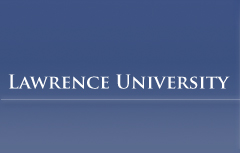Document Type
Press Release
Publication Date
8-31-2012
Abstract
Call it “back to the future.”
When Lawrence University welcomed its first class in November, 1849, 13 of the 35 students were Oneida Indians.
This year’s incoming class of new students will be nearly 12 times larger than that initial class, but Native Americans will once again be an integral part of the mix. Eight Native Americans, representing Indian nations in Arizona, Iowa, New Mexico and Wisconsin, will be among the 417 incoming freshmen of the Class of 2016.
This year’s class of 450 new students — the second-largest freshman class in Lawrence history (2010 was the largest with 452) along with 33 transfer students — arrives Tuesday, Sept. 4 to begin a week of orientation activities. Classes for Lawrence’s 164th academic year begin Monday, Sept. 10.
Emmet Yepa, one of the incoming Native American students from New Mexico, arrives on campus as a two-time Grammy Award nominee and a nationally recognized youth leader.
Yepa began singing with the 14-member drumming ensemble Black Eagles shortly after the band won a Grammy in 2004 for “Flying Free” in the Best Native American Music Album category. Yepa helped the Black Eagles garner two more Grammy nominations in 2005 and 2007. He composed the song “Your Precious Smile,” a tribute to his younger sister, Angelina, for the 2007 Grammy-nominated album “Voice of the Drums.”
“I’ve been singing since I was very, very young,” said Yepa. “My dad introduced me to singing and I eventually joined the group. I sing every day. I’m always singing at home. I enjoy singing from the heart, lifting people’s spirits and making people happy.”
In 2010, Yepa and his father left the Black Eagles to form a new group, Northern Vibe, a nine-member drumming ensemble.
“We’ve had lots of people asking us if we’re going to do a CD. We’re in the process, but we haven’t completed it yet,” said Yepa, who has recording his own solo CD on his to-do list as well.
Yepa composes and performs both in English and the Towa language. Jemez Pueblo, Yepa’s hometown of 1,800 about 70 miles southwest of Santa Fe, is the only place in the world where Towa is spoken.
“It’s (Towa) pretty hard to pass on, because it’s not a written language, it’s only an oral language,” said Yepa, the oldest of four siblings.
Last December, Yepa added a “Champions of Change” award to his budding resume. Yepa was one of just 11 Native Americans nationally recognized in a White House ceremony with President Obama that honored individual efforts to give back to the community and demonstrate leadership. Yepa was cited for his efforts to establish the first-ever recycling program in Jemez Pueblo. The Walatowa (traditional name of Jemez) Green Stars Recycling Group headed by Yepa focuses on preserving and keeping ancestral lands beautiful through recycling.
Yepa is a member of one of the most ethnically and geographically diverse incoming classes Lawrence has ever had:
• 21 percent (88) of the 417 freshmen are students of color.
• 38 states and 18 countries are represented
• Five of the top 10 states from which this year’s freshmen hail are Western states — California, New Mexico, Colorado, Washington and Oregon.
• 41 freshmen are international students, with China (6), Vietnam (4) and Ghana (3) accounting for the most.
Academically, 45 percent of this year’s freshmen ranked in the top 10 percent of their graduating class while 70 percent were in the top quarter of their class. The average grade point average of the incoming freshmen was 3.62.
“In terms of academic quality, this year’s class looks very similar to last year’s class,” said Ken Anselment, dean of admissions and financial aid. “However, this year we enrolled a class that, in addition to being one of our largest, is more ethnically and geographically diverse than we have seen in a very long time.”
Approximately 80 percent of the freshmen are enrolling in Lawrence’s college of liberal arts and sciences while 20 percent are enrolling in the conservatory of music.
Ninety-four percent of incoming freshmen received need- or merit-based financial aid with need-based financial aid packages averaging $30,600.
Recommended Citation
Lawrence University, "Ethnically Diverse Freshman Class Arrives Sept. 4 for 2012-13 Academic Year" (2012). Press Releases. 391.
https://lux.lawrence.edu/pressreleases/391
